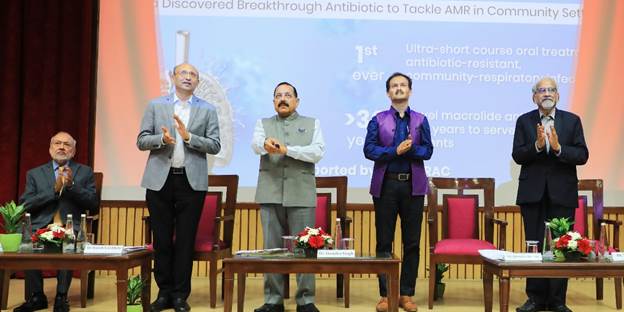New Delhi: In a landmark achievement for India’s biotechnology sector, Union Minister Dr. Jitendra Singh today unveiled the country’s first indigenous antibiotic, Nafithromycin, designed to tackle antimicrobial resistance (AMR). The launch event, held today, marked a significant milestone in India’s healthcare innovation, underscoring the nation’s growing prowess in biotechnology.
Developed with support from the Biotechnology Industry Research Assistance Council (BIRAC), a unit under the Department of Biotechnology, Nafithromycin is produced by pharmaceutical company Wockhardt under the trade name Miqnaf. The antibiotic targets Community-Acquired Bacterial Pneumonia (CABP), a deadly condition caused by drug-resistant bacteria, which is responsible for over 2 million deaths globally each year. India alone bears 23% of the global burden of pneumonia, and drug resistance has made existing treatments like azithromycin less effective.
Dr. Jitendra Singh, in his address, praised Prime Minister Narendra Modi for his instrumental role in supporting research and innovation in the country since 2014. “It is only after 2014, under the leadership of Prime Minister Modi, that researchers received the right kind of support to explore their potential,” said Dr. Singh. He highlighted that Modi’s personal intervention had significantly eased the research and development processes.
Nafithromycin, a game-changer in treating drug-resistant pneumonia, is ten times more effective than current antibiotics like azithromycin, and boasts a short, three-day treatment regimen. Its ability to target both typical and atypical pathogens positions it as a superior option for patients suffering from resistant infections. Moreover, it has minimal gastrointestinal side effects, no significant drug interactions, and is unaffected by food intake.
“This new antibiotic is a historic breakthrough, being the first developed globally in over 30 years in its class,” said Dr. Jitendra Singh. “It is a potent solution to address the growing threat of AMR, a global health crisis that prolongs illnesses and increases healthcare costs.”
Nafithromycin was developed over 14 years of rigorous research, with an investment of ₹500 crores. The drug has undergone clinical trials across the U.S., Europe, and India, showing outstanding results in combating resistant pathogens. The initiative, supported by BIRAC under the Biotechnology Industry Partnership Program (BIPP), exemplifies the power of public-private collaboration in advancing healthcare solutions.
The Minister emphasized the importance of ongoing investment in AMR research and development, especially in the context of global health challenges. He also stressed that the COVID-19 pandemic has greatly raised public awareness of biotechnology’s potential in tackling health crises.
“This achievement highlights India’s capacity to lead global efforts in addressing AMR and advancing medical innovation,” said Dr. Singh. He called for continued collaboration between research institutions, the pharmaceutical industry, and government bodies to strengthen India’s leadership in biotechnology.
Dr. Jitendra Singh also revealed that Nafithromycin is awaiting final approval from the Central Drugs Standard Control Organization (CDSCO) for manufacturing and public use. Once approved, this antibiotic will be a major weapon in India’s fight against multi-drug-resistant infections.
In addition, the Minister lauded the efforts of the scientific community, with leaders like Dr. Rajesh S. Gokhale, Secretary of DBT, Dr. Habil Khorakiwala, Chairman of Wockhardt, and Dr. Jitendra Kumar, MD of BIRAC, who were present at the event.
Reflecting on the launch, Dr. Singh concluded, “Nafithromycin marks a significant milestone in our fight against antimicrobial resistance, opening doors for more breakthroughs in life-saving medicines. We are committed to improving lives and building a healthier, more resilient future for all.”
The development of Nafithromycin highlights India’s determination to combat AMR and contribute meaningfully to global health, positioning the country as a leader in tackling one of the most pressing health threats of our time.





